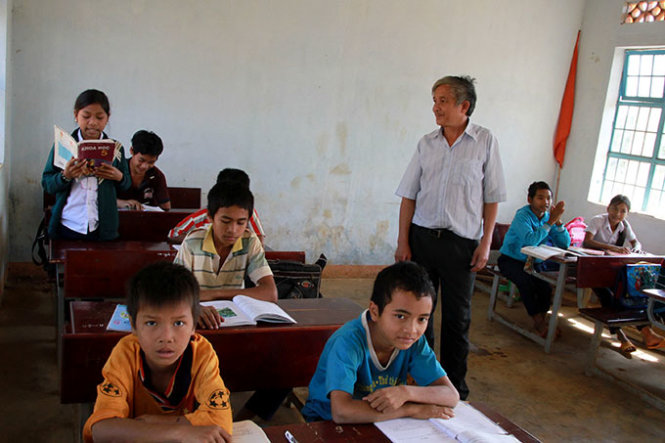Teachers in the Central Highlands province of Lam Dong have crossed into Cat Tien National Park for years to teach minority children who live in the forest core.
>> An audio version of the story is available here
Phan Van Dang has many years of experience in teaching at the branch of an elementary school in Hamlet 4 in Cat Tien District’s Phuoc Cat II Commune.
Students in the commune belong to the S’Tieng and Chau Ma minority groups, who have lived in the core of Cat Tien forest for generations.
To reach his students every Monday morning and stay at the school branch for a week, Dang has to prepare things, including clothes, food and teaching material, from Sunday afternoon.
Then the next morning, the teacher will cross into the forest on his motorbike.
“Things are OK on sunny days, but I cannot run my bike during the rainy season,” he said, adding sometimes he has to stay at the branch for weeks due to the weather.
The roughly 24km trip to the school branch also includes a steep slope where the teacher has to tie his motorbike’s wheels with chains so that the bike will not fall off the road.
“Some days, the tires broke, so I had to push my bike for hours before arriving at the school branch,” Dang remembered.
Meanwhile, female teachers work at another branch of the school in Hamlet 3 in Cat Tien District’s Phuoc Cat II Commune.
All the teachers who work in the two hamlets return home once a week to see their families and buy necessities.
The road in Hamlet 3 is not as rough as the road to Hamlet 4, as it is covered with pebbles.
Hamlet 3 has around 150 residents living in an area with 30 houses. All children in the locality are sent to school, despite the lack of classrooms there.
The school branch has just four rooms in total while it has to teach six grades, so 2nd and 3rd graders have to study in the same room, while 4th graders are allowed to study with their 5th grade seniors.
Luc Thi Tuyet, a teacher of the 2-3 grade class, said the total number of students in the village is 29, including eight first graders and two fourth graders.
“This is the first year we have had a new classroom,” Tuyet said. “Earlier, we had to study in residents’ houses,” she said, adding that teachers now also have a place to stay during the time they teach at the school, instead of living in residents’ houses like before.

Children gather to play games after class. Photo: Tuoi Tre
Locals’ support
“We’ve lived here for generations, from the time of our ancestors,” hamlet patriarch Dieu K’Khen said. “We cannot move to other places.”
“It’s lucky that we have teachers coming here to teach our children, otherwise they will know nothing but the forest life,” he added.
Last year, Dieu K’Trang, a resident in Hamlet 3, gave away his land to build a community hall (now used as a classroom for preschool students), three classrooms, and a house for teachers.
“My children and I couldn’t go to school so I really appreciate when teachers come here to teach,” he said. “I see myself needing to contribute something for the schooling,” he said, adding that he could not stand seeing children studying in makeshift rooms.
Doan Ngoc Nam, chairman of Phuoc Cat II Commune, said S’Tieng and Chau Ma people have lived in the forest for a long time.
In 1993, the central government advocated for them to settle and establish a living community there.
Local residents have also been handed a forest to guard. So far, 32 households in Hamlet 3 have agreed to protect over 1,500 hectares of the national forest, while 29 households in Hamlet 4 have protected more than 1,400 ha.
Hamlet 3 patriarch Dieu K’Mot said protecting the forest is a way for them to live with the forest better.
“It also provides us with money [from the forest environment protection service] to support our life and to send our kids to school so that they don’t have to live a farming life like their parents,” he added.
|
Electricity in strong demand Currently, besides the tough road to the commune’s center, another big obstacle for teachers as well as people living in Hamlet 3 and Hamlet 4 is the lack of electricity. Teachers in Hamlet 4 have to use oil lamps to prepare lesson plans at night. “It’s not a big deal for us, we can go to the ranger post to watch TV,” teacher Dang said. “But it’s an issue that adults in the locality have to study in the literacy night class under the blurred light.” “Only two solar batteries can solve the problem,” the teacher said of his wish for better conditions for his students. |
Like us on Facebook or follow us on Twitter to get the latest news about Vietnam!




















































